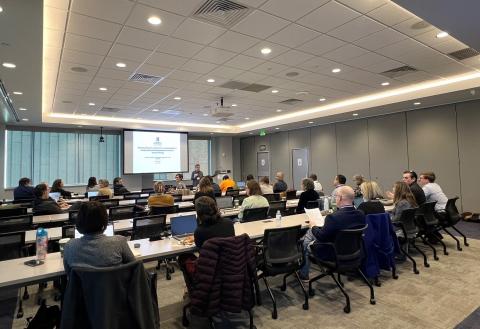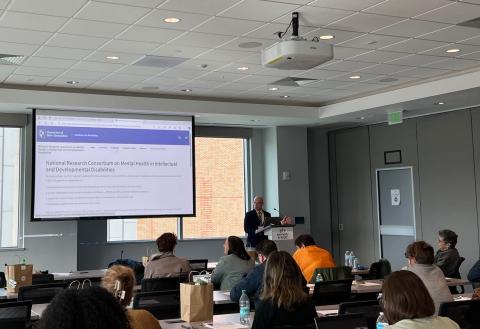The National Research Consortium on Mental Health in Intellectual and Developmental Disabilities (MH-IDD) held their sixth annual meeting on October 16 at Kennedy Krieger Institute in Baltimore, MD, which featured guest speakers from partner institutions across the country.
More than 35 researchers, policy makers, family members, self-advocates, and providers joined in to discuss the theme of this year's conference, "Inclusive Practices and Positive Approaches in IDD Research.”
Kicking off the meeting was Professor Tawara Goode, Director of the National Center for Cultural Competence at Georgetown University, who led an engaging opening exercise. Her session highlighted the critical need to consider cultural factors when designing and implementing research in the field of mental health and IDD.
The first presentation, "Elevating Strengths to Build Inclusive Systems of Supports," was delivered by Austin Myers, communications specialist and self-advocate from the University of Kansas and Dr. Karrie Shogren, Director of the Kansas University Center on Developmental Disabilities. They presented strategies for developing inclusive support systems that leverage the strengths of people with IDD.
In addition, Dr. Susan Havercamp, Professor of Psychiatry and Behavioral Health and Dr. Marc J. Tassé, Director of the Nisonger Center from The Ohio State University presented their ongoing research. Their study, titled "Including Self-Reported Behavioral Health Symptoms from Adults with ID in Estimating the Point Prevalence of Comorbidity," focuses on the importance of capturing self-reported data from people with IDD to better understand the prevalence of mental health conditions.
The next presentation of the day, "Importance of Research Participation to Self-Advocacy," was given by Melanie Hecker, MPA, self-advocate from New York, and Dr. Jessica Kramer, Associate Professor from the University of Florida. They underscored the role of research participation as a powerful tool for self-advocacy, empowering people with IDD to have a voice in the research that impacts their lives.
Dr. Andrea Caoili and Dr. Karen Weigle, Director of Research and Quality Assurance and Associate Director, respectively, of the National Center for START Services®, provided a talk on the NRC funded pilot of Beat It: A Behavioral Activation Intervention for People with intellectual Disabilities and Low Mood.
Photos



Presentations
Inclusive Research: Implications for the National Research Consortium on Mental Health in Intellectual and Developmental Disabilities
Professor Tawara Goode, Director, National Center for Cultural Competence, Georgetown University
Elevating Strengths to Build Inclusive Systems of Supports
- Austin Myers, Communications Specialist, University of Kansas
- Karrie Shogren, PhD, Director of the Kansas University Center on Developmental Disabilities, University of Kansas
Including Self-Reported Behavioral Health Symptoms from Adults with ID in Estimating the Point Prevalence of Comorbidity
- Susan Havercamp, PhD, Director of Health Promotion and Healthcare Parity, The Nisonger Center, The Ohio State University
- Marc J. Tassé, PhD, Director, The Nisonger Center, The Ohio State University
Importance of Research Participation to Self-Advocacy
- Melanie Hecker, MPA
- Jessica Kramer, PhD, OTR/L, FAAIDD, Associate Professor, Department of Occupational Therapy, University of Florida
Beat It: A Behavioural Activation intervention for People with intellectual Disabilities and Low Mood
- Andrea Caoili, EdD, Director of Research and Quality Assurance, National Center for START Services®, University of New Hampshire
- Karen Weigle, PhD, Associate Director/Director of Program Development, National Center for START Services®, University of New Hampshire